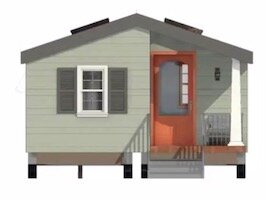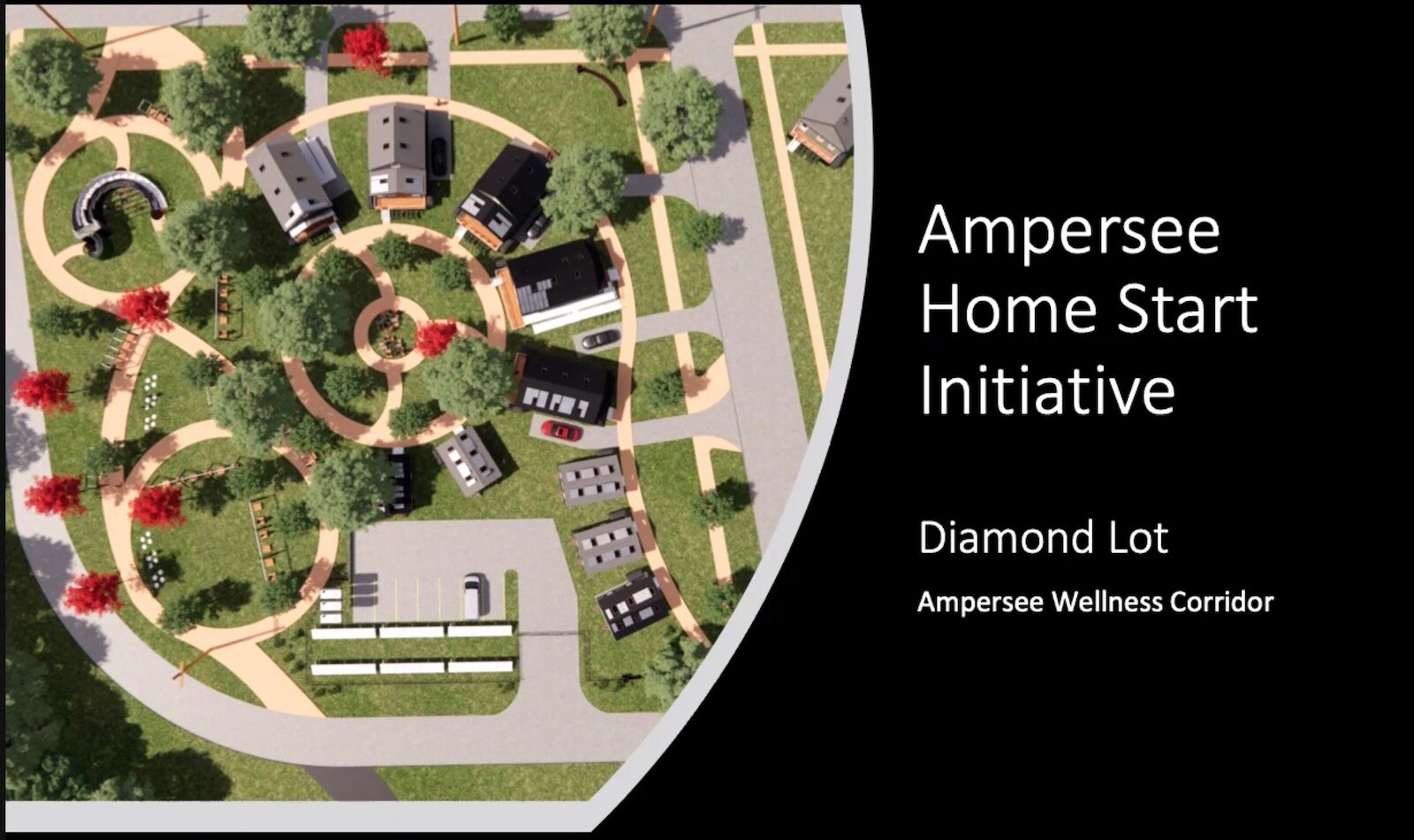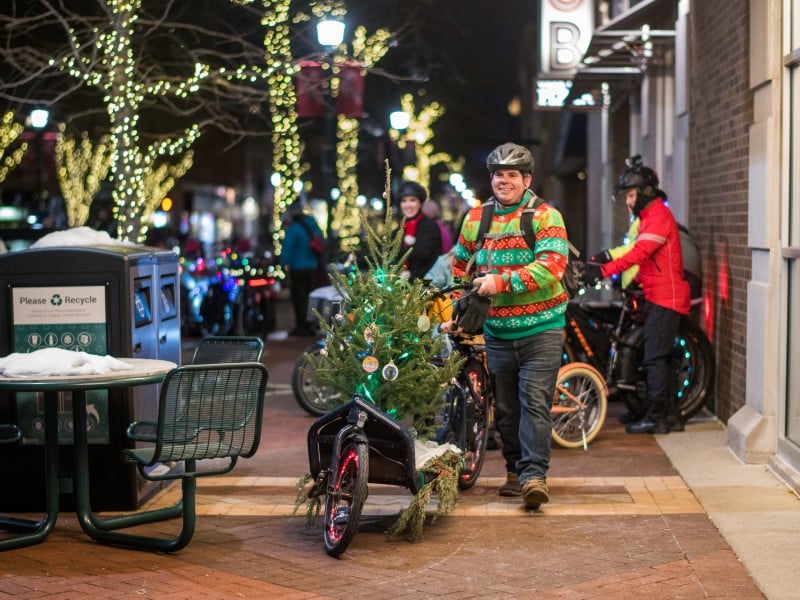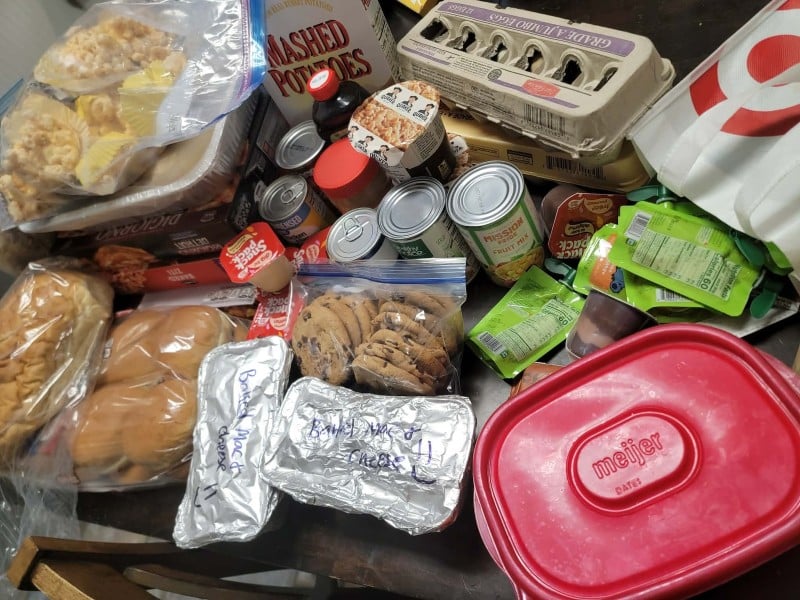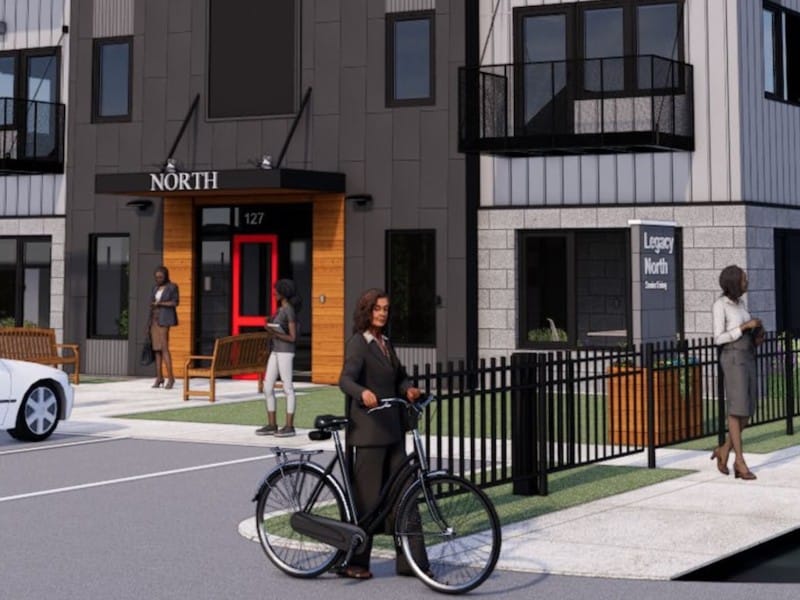This story is part of Southwest Michigan Second Wave’s series on solutions to affordable housing and housing the unhoused. It is made possible by a coalition of funders including the City of Kalamazoo, Kalamazoo County, the ENNA Foundation, and LISC.
The opening of the presentation on a project for a new community of affordable homes put a stark frame around the subject.
A moment of silence for James Hughs began a Housing Matters Kalamazoo’s online forum about the Home Start Initiative, a plan to build a new community in the area of the former Ampersee homeless encampment.
Hughs died after being found unresponsive at Martin Luther King Park Nov. 17.
“I have known Mr. Hughs for ten years, and in my experience is that he’s been homeless that entire time,” Sarah Stoll of the Disability Network says in remembrance. “He was a cool cat. He always wore sunglasses and a hat. He was a natty dresser. He wasn’t a big speaker, but he always had a kind word and a smile for everyone.”
Social worker Sarah Cain, moderating the event, reminds participants that as winter hits us, unsheltered people will die in the elements. “It’s still happening,” she says.
Housing for the unsheltered is desperately needed now. However, lack of funding and issues such as zoning ordinances are slowing the ambitious plans of the Home Start Initiative, those attending the event learned. Housing Matters forums focus on affordable housing in Kalamazoo County and are intended to provide education on existing affordable housing programs or housing issues and offer opportunities to discuss possibilities for creating additional housing throughout the County.
We first wrote about Home Start in August. It is led by Michelle Johnson, of Playgrown and the Institute of Public Scholarship.
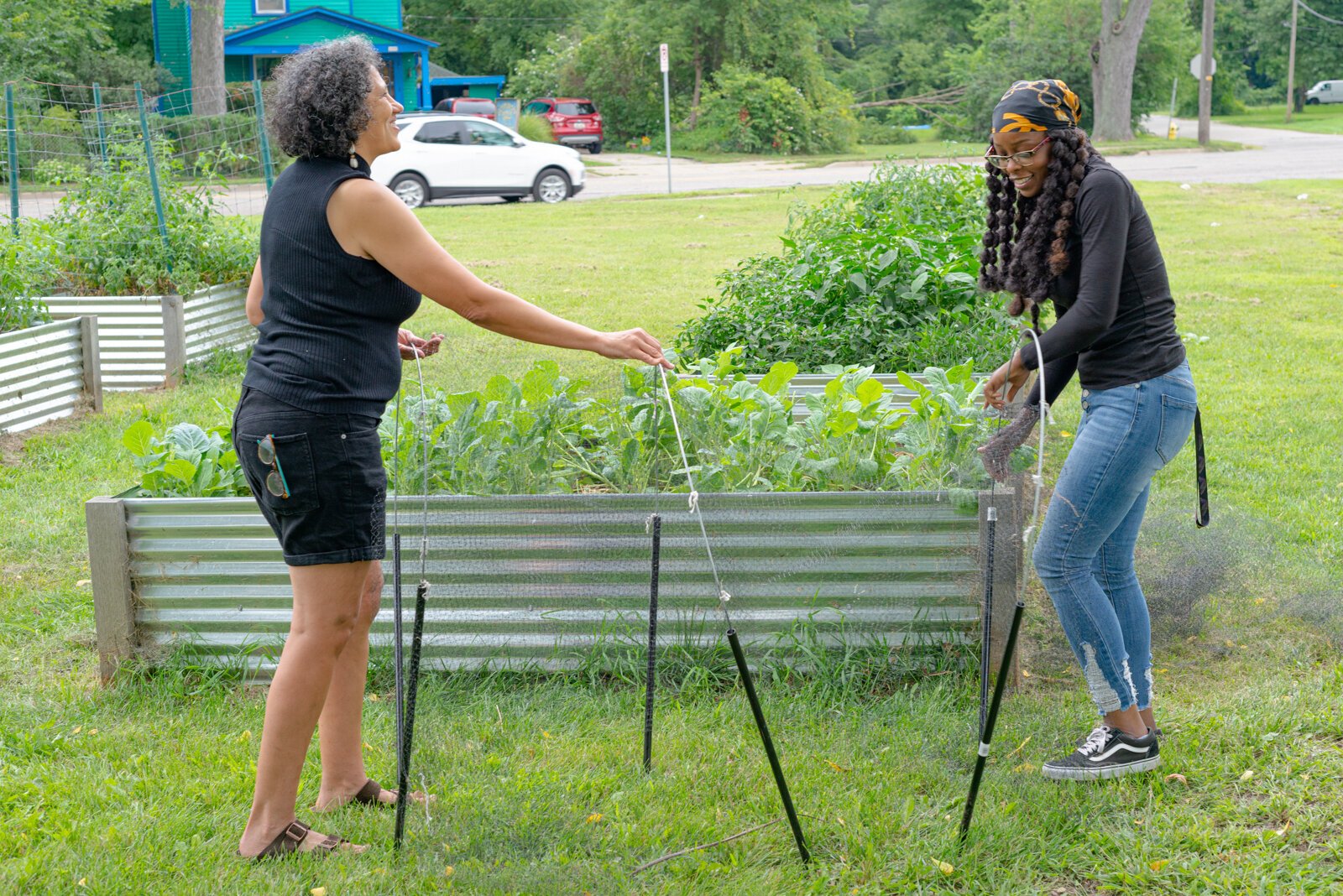
The project’s plans include a community garden, solar panels and geothermal heating/cooling, community gathering spaces and play areas, and ten homes. The houses are to range from small mobile cottages to two-story family homes.
Residents will be people “most impacted” by the housing crisis, Johnson says, mainly “black and brown women with children and economic challenges.” They’ll receive a stipend for the first three years. Instead of simply renting, residents will be paying into the co-op, with ownership being the goal.
Home Start will also provide services from financial education to emotional health to daycare.
The total cost of the project will be $4.5 million, Johnson says.
Second Wave asked, how’s the funding going? “We’re at $718,000… so you go figure,” she says.
The Kalamazoo County board of commissioners awarded Home Start $318,138 out of the Homes for All millage in April.
Connecting with the unhoused community
The presentation, which also featured programs coordinator and head of the community garden Mary Crosby, and grant writer Jennifer Mills, got positive responses from the audience, which mostly included people from local housing organizations and volunteers for unsheltered people.
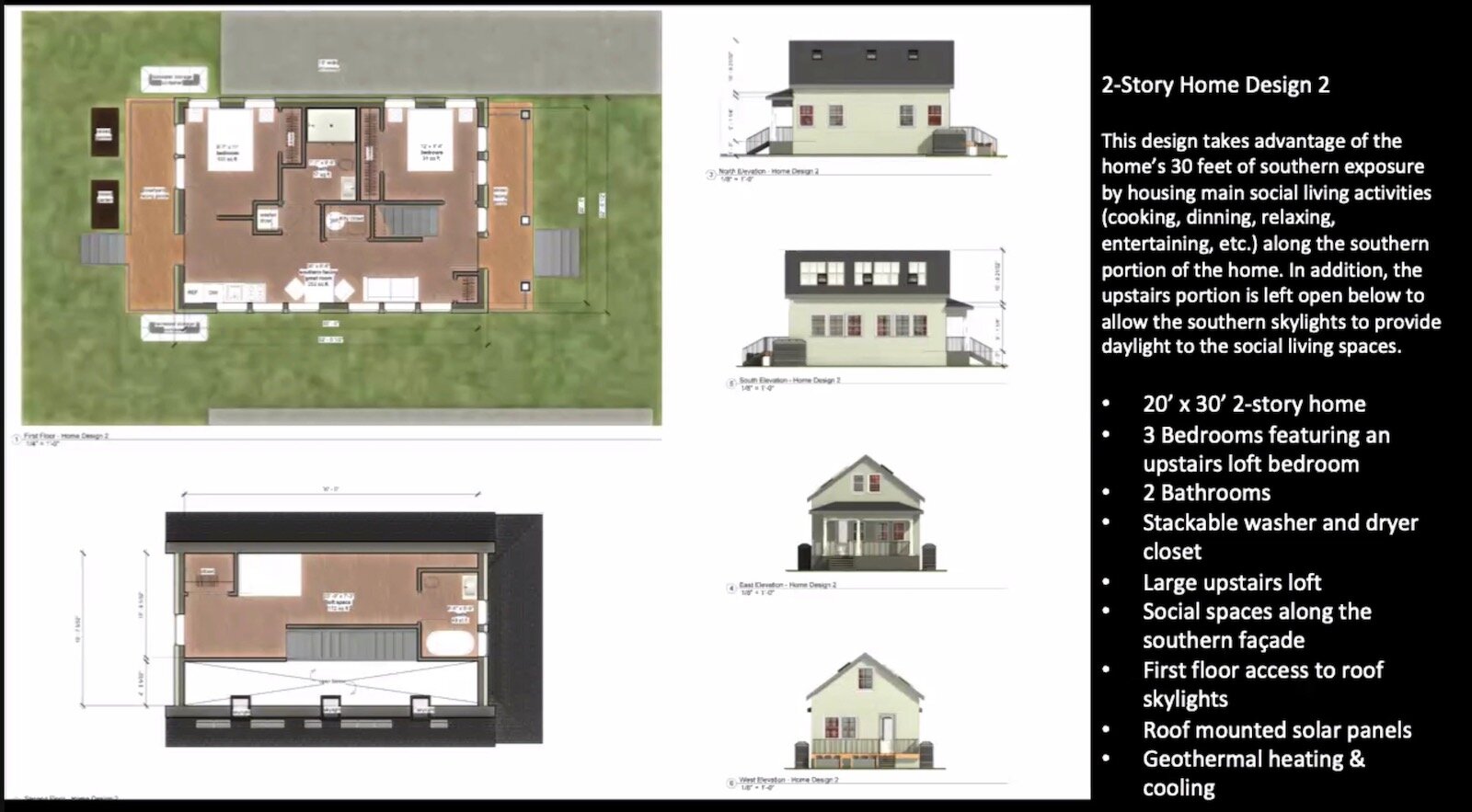
Cain says, “I love that you are thinking big-picture, thinking outside the box, getting the information and the knowledge from the people who are going to benefit from this…. It’s going to be a wonderful addition to our community, and I’d love to take part in it. Keep me in mind for anything that you need.”
“I’d really like to be a part of this,” says Yancy Barrett, a formerly homeless person who we wrote about in October. “I think it’s awesome. I think the whole plan is sexy!”
“Yancy was critical for us in helping to build community, build trust,” Mills says. “One of the impulses of this project is to include the voices of the most impacted on how we do this, and Yancy was part of helping us do this.”
Since its start, when Johnson met with 26 people being removed from the encampment in the fall of 2021, the project has sought the input and connection with people who need housing the most.
Another way Home Start has stayed connected is through its community garden. Crosby spoke on connecting with people by getting “your hands in dirt.”
While tending Home Start’s raised garden beds, growing tomatoes, collard greens, peppers, “I have come across some very beautiful things,” Crosby says. “There would be people of the community, and some of the people would be homeless, they would come with their bag, picking, and we’d discuss what’s been going on with them…. We’re pulling weeds, sharing stories, and it’s a beautiful thing because collard greens have been pulling people together in discussion and dinner for many a good years.”
She noticed that people were not only using the food, they were also using the garden’s water tank for washing and drinking, “though it says, do not drink the water.” That made her realize how “there really isn’t health equity without food equity.”
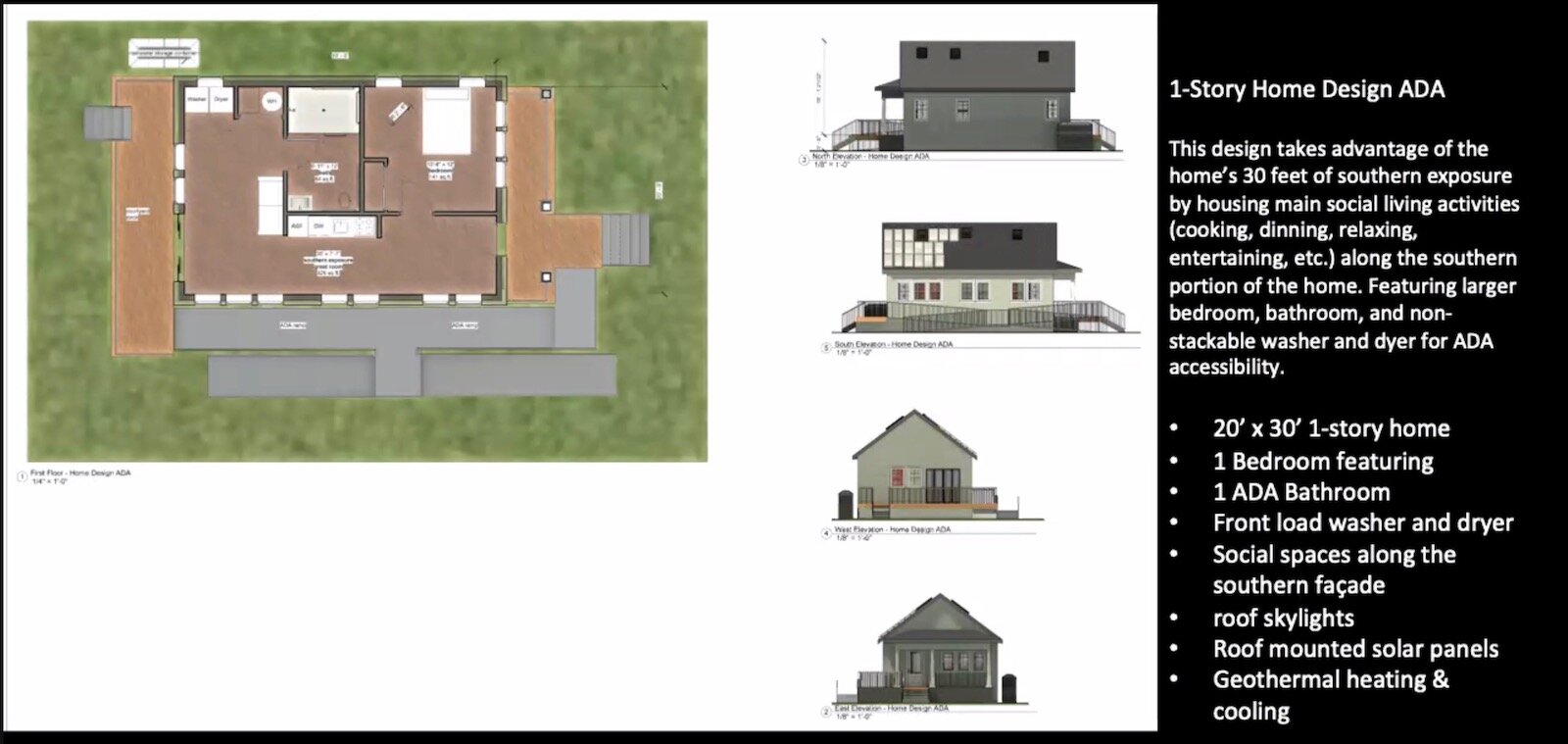
Crosby talked to local businesses about selling produce to raise funds and provide jobs — customers would want locally grown food, and know that their purchase would be going to “a solution,” she says.
Question time
Elsie Romano’s question started off the Q&A with a question about a number of the homes that have wheels that would be trucked to the site: “Why is transport necessary?”
Four of the planned homes are to be made up of wheeled units — they were to be “tiny homes” but are now “cottages,” Johnson says.
Johnson and Mills say they wanted flexibility — residents might become owners, and might want to leave with their homes to other communities.
But “getting wheeled units legal in Kalamazoo is part of the struggle,” Mills says with a laugh. “We are working closely with state and local officials to make that possible… but there are barriers,” barriers that zoning officials could help them overcome, Mills says.
Second Wave asked about funding, and the connected question: When will shovels start digging?
“Given full funding, our estimate from our architects is this could be up in 14 months,” Johnson says. “That means, we have a good deal of funding yet to raise.”
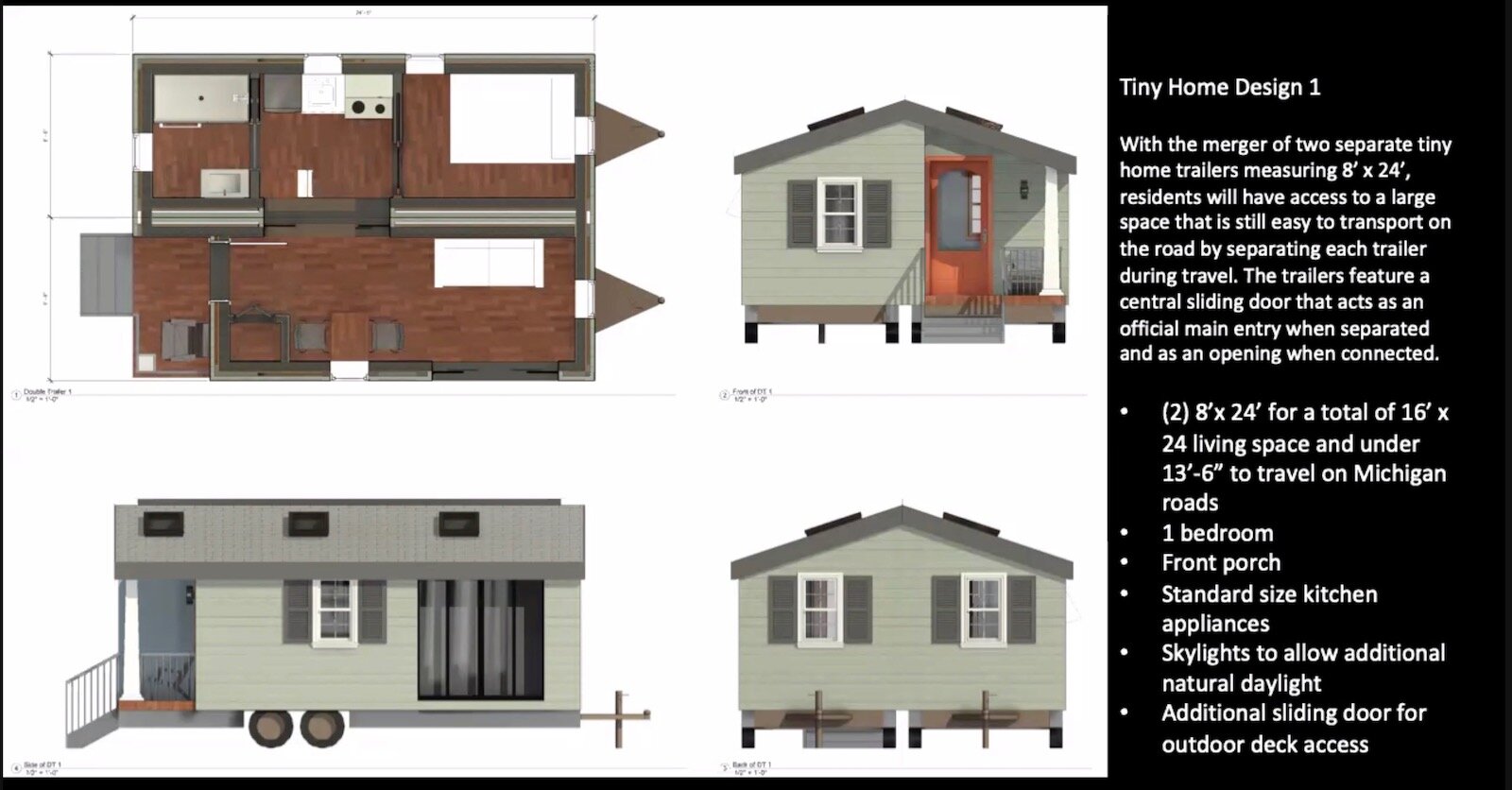
Mills is “finding ways to access city and county funds, and is reaching out on a state level,” Johnson says. “We have a number of grants out. But I have faith in our community, I have faith in our grantors, I have faith, I have so much faith in this project and our team. I believe that we can round up funding,” she says.
Mills says, “to add to that, we have another million that we feel confident is coming. But some of the barriers with seeking grants, as many of you on this call probably understand, are when you seek larger, federal grants, you’ve got a lot of restrictions that come with that.”
They are “working with the state around policy change around some of those restrictions, to educate local granters of federal grants what some of those barriers are. But it’s going to be super important, to fully launch this (at) 100% completion, to get private funding that allows for some of that innovation,” Mills says.
“I would say some of the unique pieces that Dr. Johnson has brought to this that are hard to fit into traditional granting streams are community-based participation, including most-impacted voices, providing stipends for those folks participating, getting that kind of thing funded,” Mills says.
Structural, not social, innovations seem to get the federal and state dollars. “It’s easier right now to get funding for solar panels,” Mills says.
In response to Sarah Gerstner’s questions on home costs and who will be living there, Johnson says the homes will rent for rates from $157 to $61 a month. Stipends will help make those low prices even more affordable.
“We’re very much invested in the people who want to live there, as encampment residents…. because we said we’re going to try to make some homes for y’all,” Johnson says. Unhoused people are part of Home Start’s advisory council, and have been volunteering to help build.
“These folks are already putting in the work right now for this housing,” she says. They’ve been earning “sweat equity.”
“And also, as suggested by Dr. Mills earlier, women with children,” will be sought as residents, “black and brown women with children and economic challenges.”
“And we realize we’ve only got ten units, but what we know we have is a replicable model that we can utilize in other places that can continue to serve these populations,” Johnson adds.
Norman Young of Housing Matters comments that $4 million “for 10 homes seems like a lot of money.”
Mills responds it’s a “slightly over $4 million project. But really the construction of the homes is just about $2.3 million, the rest of that is capacity-building.” She says that “a big chunk of that is personnel to run some of the services that we’re going to provide, to build this capacity of a black and brown owned development corporation.”
Sarah Stoll asks, “Was the millage money just used for the housing aspect or the entire project?”
Mills answers, “the millage funds have to be used last, and are right now a small portion of our budget. But it is contributing, and it is going to be a multi-year opportunity for us in terms of getting those houses to the finish line….” There is a lot more flexibility with the millage funds, compared to state and federal funding, she says. “They could be used in the construction of the wheeled units,” for example.
Tobi Hanna-Davies, of ISSAC and TRHT, asks, “Can you do some housing… before you can afford to do the rest?”
They’re now in the “getting the ground ready” phase, Johnson says, which includes looking over the environmental aspects.
“We feel pretty strongly, at least with this next round of funding, that we can start to get our development plans, some of the nuts and bolts (underway) over the next couple months in our timeline. The cottages might be quicker to construct, however, we have these challenges to building what are seen as temporary units. So, yes, we certainly could be getting started, but the plan is to be able to construct them all simultaneously.”
Mills adds, “because of some of the zoning issues, the foundation houses will be the priority in phase one, as we work through some of the zoning issues with the wheeled units.”
Mills continues, “It’s interesting, I’m not a housing developer, I’m in public health, and watching the process it’s really put the rubber to the road in terms of what we mean when we talk about structural barriers. The length of time it has increased to our labor to have to have conversations on zoning issues on wheels, is a lot…. And that’s while all of us are not getting paid, currently for the work that we’re doing.”
Crosby acknowledged the pressure to create housing as soon as possible.
“Just hearing about how there are babies out there, while the weather is changing,” she says. “I’ve literally gone in the woods… like ‘Hello? Anybody out there?’ And there is a community of people in the woods. I just came with some couscous and some vegetables from the garden, cooked that, passed out some corn, and they were just so grateful to have warm food.”
Crosby says the team will keep connecting with unhoused people, to work to get them food, supplies — and she calls on all of Kalamazoo to give. “Everyone has an extra coat right now… that we can afford to give to somebody so they don’t die out there.”
“We’re trying to give little pieces of that, until the big shebang,” she says.
For the archived Zoom recording and chat, visit here.
Starting in January, Home Start will hold stakeholder/advisory council meetings, with potential residents invited, at The Space, 320 E. Michigan Avenue. Meetings will be at noon on the second and fourth Tuesday of every month.

